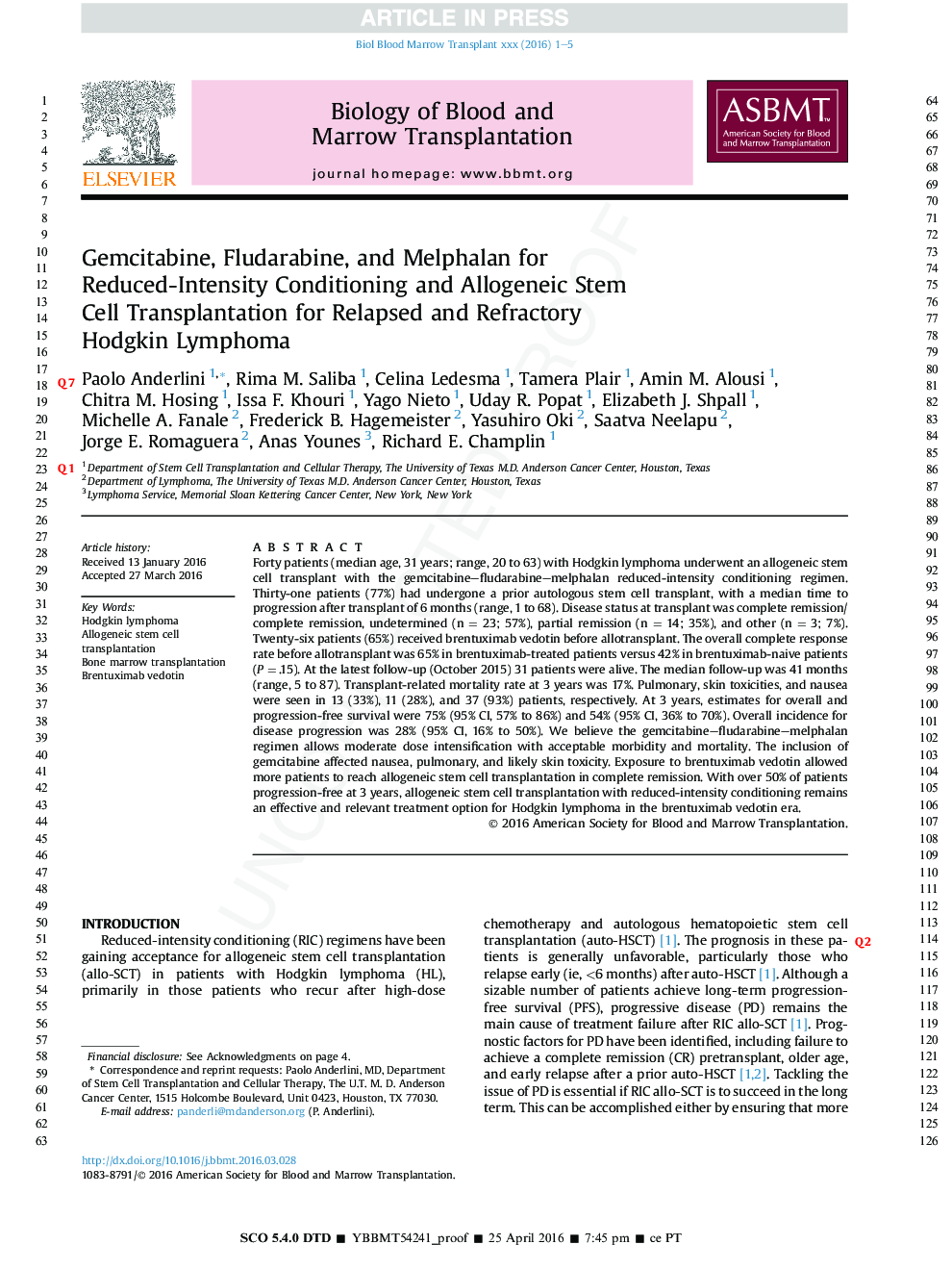| کد مقاله | کد نشریه | سال انتشار | مقاله انگلیسی | نسخه تمام متن |
|---|---|---|---|---|
| 8431052 | 1546252 | 2016 | 5 صفحه PDF | دانلود رایگان |
عنوان انگلیسی مقاله ISI
Gemcitabine, Fludarabine, and Melphalan for Reduced-Intensity Conditioning and Allogeneic Stem Cell Transplantation for Relapsed and Refractory Hodgkin Lymphoma
دانلود مقاله + سفارش ترجمه
دانلود مقاله ISI انگلیسی
رایگان برای ایرانیان
کلمات کلیدی
موضوعات مرتبط
علوم زیستی و بیوفناوری
بیوشیمی، ژنتیک و زیست شناسی مولکولی
تحقیقات سرطان
پیش نمایش صفحه اول مقاله

چکیده انگلیسی
Forty patients (median age, 31 years; range, 20 to 63) with Hodgkin lymphoma underwent an allogeneic stem cell transplant with the gemcitabine-fludarabine-melphalan reduced-intensity conditioning regimen. Thirty-one patients (77%) had undergone a prior autologous stem cell transplant, with a median time to progression after transplant of 6 months (range, 1 to 68). Disease status at transplant was complete remission/complete remission, undetermined (n = 23; 57%), partial remission (n = 14; 35%), and other (n = 3; 8%). Twenty-six patients (65%) received brentuximab vedotin before allotransplant. The overall complete response rate before allotransplant was 65% in brentuximab-treated patients versus 42% in brentuximab-naive patients (P = .15). At the latest follow-up (October 2015) 31 patients were alive. The median follow-up was 41 months (range, 5 to 87). Transplant-related mortality rate at 3 years was 17%. Pulmonary, skin toxicities, and nausea were seen in 13 (33%), 11 (28%), and 37 (93%) patients, respectively. At 3 years, estimates for overall and progression-free survival were 75% (95% CI, 57% to 86%) and 54% (95% CI, 36% to 70%). Overall incidence for disease progression was 28% (95% CI, 16% to 50%). We believe the gemcitabine-fludarabine-melphalan regimen allows moderate dose intensification with acceptable morbidity and mortality. The inclusion of gemcitabine affected nausea, pulmonary, and likely skin toxicity. Exposure to brentuximab vedotin allowed more patients to reach allogeneic stem cell transplantation in complete remission. With over 50% of patients progression-free at 3 years, allogeneic stem cell transplantation with reduced-intensity conditioning remains an effective and relevant treatment option for Hodgkin lymphoma in the brentuximab vedotin era.
ناشر
Database: Elsevier - ScienceDirect (ساینس دایرکت)
Journal: Biology of Blood and Marrow Transplantation - Volume 22, Issue 7, July 2016, Pages 1333-1337
Journal: Biology of Blood and Marrow Transplantation - Volume 22, Issue 7, July 2016, Pages 1333-1337
نویسندگان
Paolo Anderlini, Rima M. Saliba, Celina Ledesma, Tamera Plair, Amin M. Alousi, Chitra M. Hosing, Issa F. Khouri, Yago Nieto, Uday R. Popat, Elizabeth J. Shpall, Michelle A. Fanale, Frederick B. Hagemeister, Yasuhiro Oki, Saatva Neelapu,